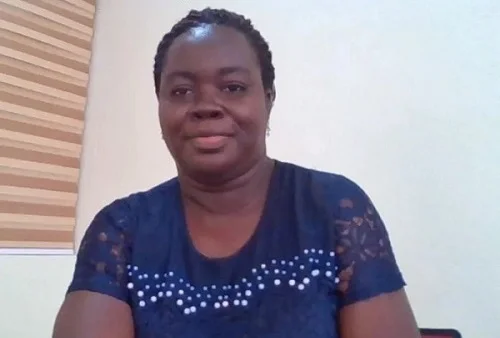Hot!
Edna Frimpong: The ‘shoemaker girl’ producing stylish footwear

About three weeks ago, we told the story of three entrepreneurs including two sisters, Kimberly and Priscilla, who are breaking new grounds in the area of local chocolate manufacturing.
In this edition, we cast the lens on another young female entrepreneur, Ms Edna Frimpong, who has resolved to build “a sustainable business and create jobs” by producing durable and affordable footwear.
Local footwear manufacturing has long been dominated by men but she is challenging the status quo with the footwear brand, “Fash_Slippers,” which has attracted a lot of clients in the past two years at Mataheko in Accra.
The self-taught shoemaker recently spoke to The Spectator about operations and prospects of the company which makes handcrafted leather slippers and sandals for both male and female.
Background
Edna attended Maamobi ‘1’ Junior High School in Accra before gaining admission to Adonten Senior High School at Aburi in the Eastern Region where she studied General Arts.
Currently, she is pursuing degree in Public Relations at Ghana Institute of Journalism, but said she acquired the skill from her father who has been a professional shoemaker for the past 20 years.


Being the first of three siblings, she lived with her father since childhood and used to help him at the workshop after school and eventually started doing what the father does.
After completing high school, she worked with Sub Saharan Education Project (SSEP) a non-governmental organisation, as a Project Coordinator for eight years but the organisation could not survive due to the COVID-19 pandemic.

In order not to be idle, she decided to establish the Fash_Slippers brand and take the shoe making craft a notch higher by making her works visible on social media platforms.
She said the idea was to ‘modify’ her father’s business and possibly take over from him in future, adding that the business has taught her to “manage time and pay attention to details.”
Brand
‘The Shoemaker Girl’(a nickname she has adopted) said the emerging footwear brand has for the past two years received good patronage and remains committed to “crafting comfortable and stylish” footwear for clients.
Aiming to venture into other types of leather products in future, the company currently sells its range of footwear at GH¢ 100.00 minimum.

According to her, there has not been ‘discrimination’ on the job and that people rather patronise the footwear because they are “made by a woman.”
“Our footwear are made in Ghana from quality leather, they are well-crafted, affordable and meet the needs of all classes of people. The business has a beautiful future and we want to become one of the biggest footwear brands,” she noted.
The Founder and Creative Director admitted that the shoe making business has been profitable as it has enabled her to fund her tertiary education. For this reason, she hopes to continue making footwear even after obtaining her Bachelor’s Degree.
“I hope to get more money to re-invest and acquire the necessary skill through my education and apply it to my business,” she added.
Challenges
Flash_Slippers currently employs a few hands as and when demand for the footwear increases and intends training individuals who want to develop a skill in footwear making.
Apart from inadequate funds and equipment, Edna admits that sales revenue could be quite unstable especially when there is no ready market for the footwear.
She believes local businesses should be given the needed support to operate in more conducive environment in order to be successful.
“Price of raw material keeps increasing every day and this is a challenge. And if there are enough machines, it can speed up the production process and reduce human labour,” she says.
Advice
While expressing appreciation to individuals who have contributed to the growth of her business, she advises young girls to develop their skills in addition to the knowledge they acquire in school.
“When you take a decision commit it to the hands of God, do your part and He will do the rest. Never be ashamed of your hustle, no one will feed you if you are broke, be dirty to get your food instead of being clean and hungry,” she posted recently.
By Ernest Nutsugah
Hot!
Swedru All Blacks back to winning ways, Roshan humble King Faisal

Sekondi Rospak FC made it eight wins in eight successive home games after three second-half goals from John Amoah, Joseph Ntow and Stephen Anthony Kofi. John Amoah opened the scoring in the 55th minute after a barren first half. Joseph Ntow added to the tally in the 56th minute before Stephen Anthony Kofi rounded things up in the 74th minute to give Rospak a 3-0 win over former Premier League side King Faisal.
Elsewhere at Swedru – leaders Swedru All Blacks humbled PAC Academy in an emphatic 2-0 win. Zayat Bubakari scored first for Swedru All Blacks in the 27th minute before Rudolf Junior Nana Kwasi Mensah made it 2-0 in the 34th minute. Swedru All Blacks are top of the table with 36 points – 4 points ahead of second placed Rospak FC.
Meanwhile, Former Premier League side Cape Coast Mysterious Dwarfs recorded their fourth successive home victory after beaten New Edubiase United 2-1 at the Robert Mensah Park. Enoch Odoom struck first for Cape Coast Mysterious Dwarfs in the 19th minute but Steven Asante equalized for New Edubiase United before halftime. After the interval, Godfred Eshun scored from distance in the 65th minute to help Cape Coast Mysterious Dwarfs secure all the points.
Here are the results in Zone Two

Hot!
Cervical Cancer alert: Avoid sex at early age

The Programmes Manager of Non-Communicable Diseases (NCDs) of the Ghana Health Service (GHS), Dr Mary Efua Commeh, has advised young girls to avoid sex at an early age.
This, she explained, will give the cervix the opportunity to mature before they become sexually active.
“You need to delay what we call the first sexual intercourse as much as possible to give the cervix the opportunity to mature before the person becomes sexually active,” she said.
Dr Commeh stated this in an interview with The Spectator in Accra on Tuesday as a part of the Cervical Cancer awareness month.
According to her, cervical cancer was the second leading female cancer in Ghana with a total of about 3,072 cases annually, and out of that, 1,815 deaths are recorded, representing more than 50 per cent.
She indicated that “If young girls are going to be sexually active, then you need to talk to your parents about being vaccinated.”
She explained that vaccinating young girls against human papillomavirus (HPV) has been found to be a very effective way of preventing cervical cancer.
“There are countries that started HPV vaccination years ago and they are not seeing any cervical cancers now because they would have eliminated most of the high-risk HPVs in their women. So if the high-risk HPV is not there, then obviously the results on cervical cancers are going to go down,” she added.
Dr Commmey said the HPV vaccination is recommended for young girls aged nine to 14 years, adding that it had been found to be highly effective, not just for cervical cancers but for other HPV-related cancers, such as anal cancers, cancers of the vagina, genital warts, amongst others.
She further elaborated that the idea is to put up a barrier before the HPV comes in and that once a young female encounters it, she is already protected.
She also mentioned that for cervical cancers, the main cause is called HPV infection, saying generally, all sexually active women acquire HPV at some point in their lives.
However, the Programmes Manager of NCDs at the GHS mentioned that the body has a way of clearing the HPV, explaining that it is a natural mechanism that goes on, unfortunately, there are a few women whose HPV persists.
Moreover, she noted that the numbers for Cervical Cancer tend to be much higher because at times, clients would wait, and try all sorts of medications before they finally report to the health facility saying “we actually lose some women before they get to the hospitals with over 75 per cent of the cases coming in its third and fourth stages.”
Dr Commey, therefore, called for public awareness while ensuring the availability of information for prevention and control.
By Jemima Esinam Kuatsinu







